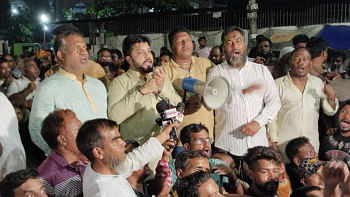Mushrooms fight climate change

The Paris Summit on climate change has ended with rich nations and developing countries clashing over who will pay for what. While all that is going on, one small company in Vietnam has been working quietly on combating climate change. 'Fargreen' is a social enterprise founded in 2013 by Trang Tran and is one of the recipients of the prestigious 'Foreign Policy's 100 Leading Global Thinkers 2015' who has received US$250,000 in funding for her innovative approach to combating climate change. This is a company that works with Vietnamese farmers, educates them to change age-old beliefs where millions of tons of rice straw are burnt during the harvesting season; a practice which according to scientists helps create thick smog and contributes to global warming.
The business model followed by Fargreen is what the company calls a "closed loop business model in which no net waste is added in the whole production process. We set up a network of farmers who collect rice straw from their own paddy field and helps them to produce high quality edible mushrooms in an eco-friendly closed-loop system. After the mushrooms are harvested, they will be shipped to Fargreen's processing and packaging center where they are processed, packaged and then delivered to the hands of the customers under the brand of Fargreen. The leftover after mushroom cultivation will be recycled back to nourish the soil as bio-fertilizer."
The key thrust to Fargreen's efforts is to build prosperous and sustainable farming communities by growing mushrooms produced in an environmentally friendly manner for both the local and international markets. The two types of mushrooms grown by Vietnamese farmers using the Fargreen model entails farmers not burning the straw which is thought of as waste; rather it is used to grow mushrooms because rice straw helps grow the fungi. The pilot project involving 10 farmers has successfully produced its first harvest of mushrooms and each farmer generated an extra $2 of income per day, supplementing the usual $5 per day daily income – an increase of 40 percent.
The two varieties of mushrooms that have been successfully grown are the straw mushroom and oyster mushroom. The first is the common, everyday mushroom consumed locally while the latter is considered a delicacy suitable for export, and thus there is a "value addition" to it which may prove particularly appealing.
Ms. Tran who has a background in international development and holds an MBA degree from Colorado State understood that for any meaningful change in attitudes to take place amongst farmers, the practice would have to make monetary sense; without which no change is practically possible. In that vein, the efforts of Fargreen proves that it is possible to address the question of climate-induced changes that are affecting rice producing countries all over the world, particularly developing nations. Fargreen's innovative approach can be scaled up to a national level, it can also be a model that can be replicated in countries such as Bangladesh where farmers face the same problems as their Vietnamese counterparts about what to do with the rice straw.
Although exactly how much rice straw is produced in Bangladesh is not readily available, we have nothing to lose but everything to gain by looking into what is happening in Hai Duong province in Vietnam. If we can avoid producing the noxious smoke and greenhouse gases that are released into the atmosphere thanks to the burning of millions of tons of our own "waste straw," if the technique perfected by Ms. Tran's company is imported to transform this waste-product into a cash-earning product by helping spawn mushrooms which cater to both domestic and foreign markets, generating sales with the potential to earn foreign exchange, surely we can do that. While mushroom may not be a staple in our diet, the potential of growing oyster mushroom for the export market would definitely be of interest to our companies. Last but not the least, the leftover from the mushroom cultivation being reused as bio-fertiliser for the soil should help reduce both dependence on chemical fertilisers and reduce the cost of nourishing farmlands.
There are many nascent start-up companies in Bangladesh. The country is also home to the largest number of non-profit organisations. Both these sectors are ideally suited to replicate, through foreign tie-ups, to bring best practices from other lands, such as Vietnam, where agricultural practices and conditions are similar to ours. Farming is a sector that is a mainstay in our country (although its share of the GDP may be contracting with the rise of the service sector) and in a country of some 168 million, food security will always feature large. With the loss of farmlands due to climate-induced changes comes loss of livelihoods of farmers, and unless we do more to protect our environment, the loss will not be limited to those who toil the land. Changing attitudes through public service announcements is not going to be enough; we need to find new, innovative ways to combat practices that are harmful to the environment.
The writer is Assistant Editor, The Daily Star.

 For all latest news, follow The Daily Star's Google News channel.
For all latest news, follow The Daily Star's Google News channel. 








Comments